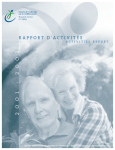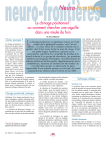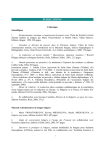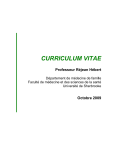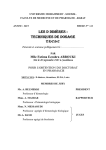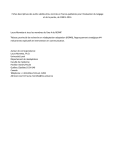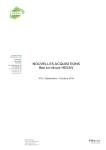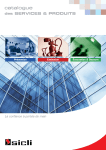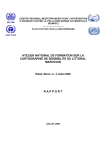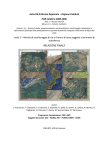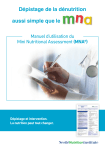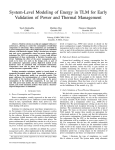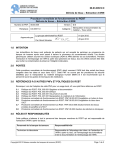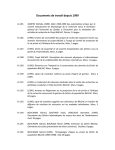Download CRGG rapport-int.biingue - Centre de recherche sur le vieillissement
Transcript
Table des matières / Table of contents Mot du directeur / A few words from the Director . . . . . . . . . . . . . . . . 2 Historique / History . . . . . . . . . . . . . . . . . . . . . . . . . . . . . . . . . . . . . . 5 Les axes / Research areas . . . . . . . . . . . . . . . . . . . . . . . . . . . . . . . . 5 Les objectifs généraux du Centre de recherche / General objectives of the Research Centre . . . . . . . . . . . . . . . . . . . . . 5 Développement et évaluation des soins et services / Development and evaluation of care and ser vices . . . . . . . . . . . . . 6 - 11 Réadaptation gériatrique / Geriatric rehabilitation . . . . . . . . . . . . 12 - 13 Vieillissement biologique et physique / Biological and physical aging . . . . . . . . . . . . . . . . . . . . . . . . . . . 14 - 18 Vieillissement cérébral / Aging of the brain . . . . . . . . . . . . . . . . . 19 - 22 Développement du potentiel psychosocial / Development of psychosocial potential . . . . . . . . . . . . . . . . . . . . 23 - 26 Les membres du Comité de déontologie de la recherche / Members of the Research Ethics Committee . . . . . . . . . . . . . . . . . . . 27 Les membres du Comité aviseur / Members of the Advisory Committee . . . . . . . . . . . . . . . . . . . . . . . . . 28 Liste du personnel du Centre de recherche / Research Centre staff . . . . . . . . . . . . . . . . . . . . . . . . . . . . . . . . 29 - 31 Organismes et entreprises pourvoyeurs de fonds / Funding agencies and enterprises . . . . . . . . . . . . . . . . . . . . . . . . . . . 32 Remerciements / Acknowledgements . . . . . . . . . . . . . . . . . . . . . . . . 33 Membre honoraire / Honorary member . . . . . . . . . . . . . . . . . . . . . . . 34 Mot du directeur Message from the director MISSION ACCOMPLIE! MISSION ACCOMPLISHED! L’année qui se termine marque un tournant pour l’histoire du Centre de recherche. Nous avons atteint, dans les délais prévus, les standards d’un centre de recherche pour le Fonds de la recherche en santé du Québec. En effet, nous comptons maintenant 30 chercheurs, totalisant 20 équivalents plein-temps, et nous détenons 2,4 millions de dollars en bourses et subventions d’organismes reconnus. Nous avons donc réalisé, voire dépassé, le plan de développement et le plan d’affaires que nous avions proposés il y a quatre ans. Rappelons qu’à nos débuts, en 1988, nous comptions deux chercheurs seulement. En 1991, nous obtenions un statut d’équipe en émergence et en 1995, de groupe de recherche. Comme le montre la figure ci-jointe, le financement du Centre de recherche n’a cessé de croître au cours des dix dernières années, tant au plan des bourses et subventions d’organismes reconnus que des contrats et commandites et des fonds d’infrastructure. Au cours de la dernière année, nous avons géré plus de 4,6 millions de dollars dont 75% provenaient d’organismes reconnus. The year just ending marks a turning point in the history of the Research Centre. Within the required time, we met the standards of the Quebec Health Research Fund (FRSQ) for a Research Centre. We now have 30 researchers (20 full-time equivalent) and $2.4 million in awards and grants from recognized agencies. Therefore, we have achieved and even surpassed the development plan and business plan we proposed four years ago. When we started out in 1988, we only had two researchers. From being recognized as an “emerging team“ in 1991, we obtained the status of a “Research Group” in 1995. As the following figure shows, the funding of the Research Centre has grown constantly in the past ten years, both in terms of awards and grants from recognized agencies and in terms of contracts, sponsorships and infrastructure funding. In the past year, we managed over $4.6 million, 75% of which was from recognized agencies. MILLIONS Ce développement d’un nouveau centre de recherche au Québec s’est effectué à contre-courant, à une époque où rationalisation et restrictions budgétaires étaient omniprésentes, tant au niveau des universités que des établissements de santé et des organismes de financement de la recherche. Une telle réalisation 5,0 4,5 4,0 3,5 3,0 2,5 2,0 1,5 1,0 0,5 0 19911992 19921993 19931994 19941995 Bourses & Subv. / Awards & Grants 2 The development of this new Research Centre went against the trend in Quebec at a time when largescale rationalization and budget restrictions affected universities, health institutions and research funding agencies. This achievement is the result of the dedication and expertise of the researchers and their teams, the unfailing support of the Sherbrooke Geriatric University Institute and the Université de Sherbrooke, and the backing of the Sherbrooke community through economic 19951996 19961997 19971998 Infrastructure 19981999 19992000 Contrats / Contracts 2000 2001 est attribuable au dévouement et à l’expertise des chercheurs et de leurs équipes, au soutien indéfectible de l’Institut universitaire de gériatrie de Sherbrooke et de l’Université de Sherbrooke et à l’appui du milieu sherbrookois via les agences de développement économique et plusieurs entreprises privées qui ont contribué au fonds spécial de la Fondation de l’Université de Sherbrooke. Les 30 chercheurs du Centre sont rattachés à cinq facultés et douze dépar tements. Plus de 70 emplois à temps plein de haute technologie ont été créés au cours des dix dernières années par le Centre de recherche. Notre centre a maintenant un rayonnement national et international qui place Sherbrooke à l’avantscène de la recherche sur le vieillissement. Au cours de la dernière année, nous avons eu le plaisir d’accueillir cinq nouveaux chercheurs : Chantal Caron et Lise Talbot des sciences infirmières, Michel Tousignant des sciences de la santé communautaire, Claire Ducharme en pharmacie et Danielle Pilon, en médecine et pharmacologie. Nous sommes actuellement en pleine période de construction et nous comptons emménager dans nos nouveaux locaux en décembre prochain. Cette construction de 3,4 millions de dollars nous permettra de doubler la superficie du Centre en plus de bénéficier de locaux plus adéquats pour l’enseignement. Nous continuons à être un milieu d’enseignement aux études supérieures très actif et dynamique. Nos programmes de maîtrise en gérontologie et de maîtrise et doctorat en sciences cliniques, option gériatrie,continuent d’attirer de nombreux étudiants. La conférence des recteurs et principaux d’universités du Québec a récemment recommandé, au ministère de l’Éducation, d’autoriser le démarrage du premier programme de doctorat en gérontologie au Canada. Les chercheurs du Centre de recherche encadrent plus de 120 étudiants à la maîtrise, au doctorat ou en stage postdoctoral. Nous avons une moyenne de six étudiants aux études supérieures par chercheur équivalent plein-temps, ce qui représente la meilleure performance des centres de recherche au Québec en ce domaine. Nous avons récemment été reconnus comme Centre d’excellence en recherche de development agencies and many private companies which contributed to the Université de Sherbrooke Foundation’s special fund. The Centre’s 30 researchers are attached to five faculties and twelve departments. In the past ten years, the Research Centre has created over 70 full time high tech jobs. Our Centre now has a national and international profile that puts Sherbrooke ìn the forefront of research on aging. In the past year, we had the pleasure of welcoming five new researchers: Chantal Caron and Lise Talbot in nursing sciences, Michel Tousignant in community health sciences, Claire Ducharme in pharmacy and Danielle Pilon in medicine and pharmacology. We are currently in the middle of a construction period and we expect to move into our new premises next December. This $3.4 million construction project will double the size of the Centre and provide better teaching facilities. We continue to be a very active, dynamic graduate teaching environment. Our master’s programs in gerontology and our master’s and PhD programs in clinical sciences with a major in geriatrics continue to attract numerous students. The Conference of Rectors and Principals of Quebec Universities recently made a recommendation that the Minister of Education authorize the creation of the first PhD program in gerontology in Canada. The researchers at the Centre supervise over 120 master’s, PhD and postdoctoral students. We have an average of six graduate students per full-time equivalent researcher, which is the best performance among research centres in Quebec in this regard. We were recently recognized as a Research Centre of Excellence of the Université de Sherbrooke. The year just ending is also a transition year since we have to plan for the future. We have initiated a strategic planning process leading to the creation of a new development plan for the next four years. This plan will be submitted to the FRSQ and will be evaluated and approved in 2002. This strategic planning exercise has led us to examine how the research areas are organized and the Centre’s main orientations. 3 l’Université de Sherbrooke. L’année qui s’écoule est aussi une année charnière puisque nous devons aussi planifier le futur. Nous avons amorcé une démarche de planification stratégique qui nous mènera à l’élaboration d’un nouveau plan de développement pour les quatre prochaines années. Ce plan sera soumis au FRSQ et sera évalué et sanctionné au cours de l’année 2002. Cet exercice de planification stratégique nous amène à réfléchir sur le découpage des axes et sur les grandes orientations du Centre. Au cours de la dernière année, nous avons procédé à une restructuration administrative. Deux adjointes ont été nommées, l’une aux affaires scientifiques (Hélène Payette) et l’autre à la recherche clinique (Johanne Desrosiers). Mme Lise Vigneux a été nommée chef des Services administratifs et nous avons engagé un adjoint pour lui prêter main-forte (Richard Hamel). Somme toute, une année 2000-2001 bien remplie, riche de réalisations et gage de promesses. Tous mes remerciements à ceux et celles qui de près et de loin ont contribué à ce succès. Dr Réjean Hébert Directeur Centre de recherche en gérontologie et gériatrie Institut universitaire de gériatrie de Sherbrooke 4 In the past year, we restructured our administrative organization. Two assistants were appointed, one for scientific affairs (Hélène Payette) and one for clinical research (Johanne Desrosiers). Lise Vigneux was appointed Head of Administrative Services and we hired an assistant to help her (Richard Hamel). All in all, 2000-2001 has been a very full year, both in terms of achievements and building for the future. I wish to thank everyone who contributed directly or indirectly to this success. Dr Réjean Hébert Director Gerontology and Geriatrics Research Center Sherbrooke Geriatric University Institute Historique History Le Centre de recherche poursuit, depuis 1988, sa mission au sein de l’établissement qui l’accueille soit l'Institut universitaire de gériatrie de Sherbrooke (IUGS). En 1991, le Centre bénéficiait d’une subvention du Fonds de la recherche en santé du Québec à titre « d’Équipe de recherche ». Le passage en 1995 au statut de « Groupe de recherche » fournissait les prémisses pour devenir officiellement un « Centre de recherche » en 1998. En désignant officiellement l’établissement comme institut universitaire spécialisé en gériatrie et en gérontologie, le ministre lui confiait la responsabilité spécifique, parmi d'autres, de développer les connaissances en gérontologie et gériatrie, de les diffuser et de contribuer à la formation des futurs intervenants et chercheurs. La dimension universitaire, soit l’enseignement, la recherche et l’évaluation des technologies, touche directement l’ensemble des activités de l’établissement. Ainsi, c’est la totalité de ses services cliniques, internes et externes, qui revêt un caractère universitaire; tous les services de soutien sont également partenaires de cette dimension universitaire. The Research Centre was established at the Sherbrooke Geriatric University Institute (SGUI) in 1988. Three years later, the Centre received a grant from the Quebec Health Research Fund (FRSQ) as a “Research Team”. In 1995 it was designated a “Research Group” which laid the foundations for it to become an official “Research Centre” in 1998. By officially designating the establishment a university institute specializing in geriatrics and gerontology, the government gave it a specific responsibility which included developing and disseminating knowledge in gerontology and geriatrics, and helping to train future professionals and researchers. The university dimension, namely teaching, research and the technological evaluation, impacts all the Centre’s activities. All its clinical services, both internal and external, have a university aspect; all the support services are also partners in this university dimension. Les axes Les activités de recherche sont regroupées sous cinq axes principaux : Research areas The Centre’s research activities are grouped into five main areas: • Development and evaluation of care and services • Geriatric rehabilitation • Développement et évaluation des soins et ser vices • Biological and physical aging • Réadaptation gériatrique • Aging of the brain • Vieillissement biologique et physique • Development of psychosocial potential • Vieillissement cérébral • Développement du potentiel psychosocial Les objectifs généraux du Centre de recherche • Développer les connaissances pour prévenir, retarder ou pallier la perte d'autonomie des personnes âgées ; • Favoriser la pluridisciplinarité et la collaboration inter-établissements dans l'élaboration et la réalisation des protocoles de recherche ; General objectives of the Research Centre • Develop knowledge to prevent, delay or alleviate functional decline in the elderly; • Encourage multidisciplinarity and cooperation between institutions in developing and implementing research protocols; • To share knowledge through scientific papers and presentations at conferences, congresses, workshops, seminars, etc. • Diffuser les connaissances scientifiques par la production d’écrits scientifiques et de présentations à des colloques, congrès, ateliers, séminaires, etc. 5 Développement et évaluation des soins et services Development and evaluation of care and services Objectif général de l’axe General objective Étroitement liée au contexte actuel de la restructuration du système de santé et de la rationalisation des services, la programmation de recherche des membres de l’axe vise à prévenir, freiner ou pallier la perte d’autonomie des personnes âgées par l’étude de ses déterminants et l’évaluation des effets d’interventions existantes ou novatrices. Closely related to the current context of restructuring the health care system and rationalizing services, the objective of the research program in this area is to prevent, delay or mitigate functional decline in the elderly by studying its determinants and evaluating the effects of existing and innovative inter ventions. Specific objectives Objectifs spécifiques De nature épidémiologique et évaluative, les activités de recherche menées au sein de l’axe touchent différents types de ser vice. Les travaux en cours s’articulent autour des trois thèmes principaux que sont 1) les déterminants de l’état de santé, 2) l’évaluation d’inter ventions existantes ou novatrices, et enfin, 3) l’organisation des services de santé. Au terme des 12 mois écoulés, on constate que ces travaux se sont poursuivis justifiant une large part des efforts de l’axe. Dans ce contexte, d’impor tants travaux ont été réalisés, notamment sur l’efficacité et l’efficience de programmes d’immunisation contre l’influenza et le pneumocoque, sur l’impact d’interventions nutritionnelles ciblant différentes clientèles dénutries et sur les effets d’un programme psycho-éducatif destiné aux familles qui prennent soin d’un proche atteint de démence. Parallèlement, plusieurs chercheurs ont collaboré à l’évaluation de programmes cliniques offer ts par l’IUGS, reflet des liens étroits qui unissent l’axe à l’Institut. Parmi ces programmes, mentionnons l’hôpital de jour et le programme de réadaptation. D’autres chercheurs de l’équipe ont mis en évidence les effets délétères d’une faible qualité de soins chez les personnes fragiles et très âgées qui vivent en milieu d’hébergement. Des travaux ont aussi été menés dans le but d’améliorer l’efficience du système de santé, par le développement et l’implantation d’un système de gestion clinique et financière basé sur l’autonomie fonctionnelle des personnes âgées. L’année 2000-2001 a aussi été marquée par l’obtention d’importantes subventions qui permettront, d’une part de fonder les bases d’études à venir, d’autre part d’évaluer de nouveaux modèles de prestation de services. Dans le premier cas, citons des travaux préparatoires à 6 The research activities in this area are both epidemiological and evaluative and relate to different types of services. Current work is organized around three major themes, namely, 1) determinants of health status, 2) evaluation of existing and innovative interventions, and 3) organization of health services. The results of the past 12 months show that these ongoing studies justify much of the effort in this area. Impor tant studies have been done, especially on the effectiveness and efficiency of influenza and pneumococcus vaccination programs, the impact of nutritional interventions targeting different malnourished populations, and the effects of a psycho-educational program for families taking care of a dementia patient. Some members of the research team collaborated in evaluating clinical programs offered by the Institute, which reflects the close ties between this research area and the Institute. These programs include the day hospital and the rehabilitation program. Other members of the team highlighted the deleterious effects of poor quality care on fragile and ver y old people living in different types of facilities. Studies have also been conducted with the objective of improving the efficiency of the health care system by developing and implementing a clinical and financial management system focusing on the functional autonomy of the elderly. The year 2000-2001 was also highlighted by the receipt of large grants that will enable the team to establish the foundations of future studies and to evaluate new service delivery models. In the first instance, preparations are being made to form two cohorts of aging people: one to elucidate the effect of nutrition on aging, the other to study mental health problems in the elderly. In the second instance, evaluations will be la mise sur pied de deux cohortes de personnes vieillissantes : l’une permettra d’élucider l’effet de la nutrition sur le vieillissement, l’autre servira de véhicule à l’étude des problèmes de santé mentale chez les personnes âgées. Dans l’autre cas, on évaluera les impacts de réseaux intégrés de services aux personnes âgées vivant à domicile et ceux d’une intervention menée dans les résidences privées d’hébergement qui connaissent des difficultés à répondre aux besoins croissants de leurs résidants. Ces travaux s’inscrivent tout naturellement dans les nouvelles orientations ministérielles en matière d’organisation de services aux aînés en perte d’autonomie, lesquelles prônent l’intégration des services et l’établissement de nouveaux partenariats avec les secteurs privé et communautaire. Ces projets se poursuivront au cours des prochaines années, entre autres, par l’ajout de nouveaux chercheurs en pharmaco-épidémiologie, en économie de la santé et en télémédecine, des secteurs en émergence aux retombées multiples pour la société québécoise. Les chercheurs • Gina Bravo : Coordonnatrice, Ph.D. mathématique ; professeure titulaire et directrice au Département des sciences de la santé communautaire de la Faculté de médecine de l'Université de Sherbrooke. Chercheureboursière du FRSQ. Thèmes de recherche : Efficacité de l'activité physique dans la prévention et le traitement de l'ostéoporose. Sensibilité des mesures au changement. Qualité des soins dispensés dans différents milieux de vie. • Martin Buteau : D.Sc. gestion ; professeur titulaire au Département de systèmes d’information et méthodes quantitatives de gestion et secrétaire général de l’Université de Sherbrooke. Thèmes de recherche : Gestion de l'information, évaluation des coûts dans différents milieux d'hébergement. • Philippe De Wals : M.D. santé communautaire, Ph.D. épidémiologie; professeur agrégé du Département des sciences de la santé communautaire de la Faculté de médecine de l'Université de Sherbrooke. Thèmes de recherche : Évaluation des programmes de promotion, de prévention primaire (immunisation) et done on the impacts of integrated service networks for the community-dwelling elderly and of an inter vention program in private residences that have difficulty meeting the growing needs of their residents. This work fits in well with the government’s new orientations in regard to the organization of ser vices for the fragile elderly, which advocate the integration of ser vices and the establishment of new par tnerships with the private and community sectors. These projects will continue over the next few years with the help of new researchers in pharmacoepidemiology, health economics and telemedicine, which are emerging sectors with numerous implications for Quebec society. Researchers • Gina Bravo: Coordinator, PhD mathematics; Full Professor and Director, Department of Community Health Sciences, Faculty of Medicine, Université de Sherbrooke. FRSQ Researcher/Award Holder. Research themes: Effectiveness of physical activity in the prevention and treatment of osteoporosis. Responsiveness of measures. Quality of care delivered in different environments. • Martin Buteau: DSc management; Full Professor, Department of Management Information Systems and Quantitative Methods, and Secretary General, Université de Sherbrooke. Research themes: Information management, evaluation of costs in different residential facilities. • Philippe De Wals: MD community health, PhD epidemiology; Associate Professor, Depar tment of Community Health Sciences, Faculty of Medicine, Université de Sherbrooke. Research themes: Evaluation of promotion, primar y prevention (immunization) and screening programs, especially for the elderly. • Nicole Dubuc: Nurse, MSc clinical sciences, doctoral candidate; Assistant Professor, Department of Nursing Sciences, Faculty of Medicine, Université de Sherbrooke. Research themes: Clinical, operational, financial and research management related to the functional autonomy of the elderly, clinical evaluation and estimation of the costs of services required by the frail elderly. 7 • Claire Ducharme: MSc pharmacy, MA (gerontology), de dépistage, notamment chez les personnes âgées. • Nicole Dubuc : Infirmière, M.Sc. sciences cliniques, Ph.D. en cours ; professeure adjointe au Département des sciences infirmières de la Faculté de médecine de l'Université de Sherbrooke. Thèmes de recherche : Système de gestion clinique, opérationnelle, financière et de recherche en fonction de l'autonomie fonctionnelle des personnes âgées, évaluation clinique et estimation des coûts des ser vices requis par les personnes âgées en per te d'autonomie. • Claire Ducharme : Pharmacienne, M.Sc. pharmacie , M. A. (gérontologie). Thèmes de recherche : Auto-administration des médicaments, observance médicamenteuse. Problèmes de pharmaco-cinétique spécifiques à la personne âgée notamment l’évaluation de la fonction rénale. • Réjean Hébert : M.D. gériatrie, M. Phil. épidémiologie ; directeur du Centre de recherche en gérontologie et gériatrie, professeur titulaire du Dépar tement de médecine de famille de la Faculté de médecine de l'Université de Sherbrooke, directeur scientifique de l’Institut du vieillissement (Institut de recherche en santé du Canada). Chercheur-boursier du FRSQ. Thèmes de recherche : Recherche évaluative et épidémiologique en géronto-gériatrie. Dépistage des personnes âgées à risque de per te d'autonomie. Évaluation des ressources requises par les personnes âgées en per te d’autonomie. Épidémiologie de la démence. Intervention auprès des familles de malades déments. Évaluation, prévention, épidémiologie et gériatrie. • Hélène Payette : Nutritionniste, Ph.D. sciences cliniques ; professeure agrégée au Dépar tement des sciences infirmières de la Faculté de médecine de l'Université de Sherbrooke. Chercheure-boursière du FRSQ. Thèmes de recherche : Méthodologies de l’appréciation de l’état nutritionnel chez les personnes âgées incluant les appor ts alimentaires, les dimensions (anthropométriques) et la composition (impédancemétrie bioélectrique) corporelle. Prévalence et dépistage des risques nutritionnels parmi la population âgée en perte d’autonomie à domicile. Évaluation d’interventions nutritionnelles et de programmes communautaires de soutien alimentaire pour les personnes âgées en perte d’autonomie à domicile. Étude longitudinale des rela- 8 pharmacist. tions entre la nutrition et le vieillissement réussi. • Michel Préville : Sociologue, Ph.D. santé communautaire, professeur adjoint au Département des sciences de la santé communautaire de la Faculté de médecine de l’Université de Sherbrooke. Chercheur-boursier du CQRS. Research themes: Self-medication, drug compliance. Specific pharmacokinetic problems of the elderly, especially evaluation of renal function. • Rejean Hébert: MD geriatrics, MPhil epidemiology; Director, Gerontology and Geriatrics Research Centre; Full Professor, Department of Family Medicine, Faculty of Medicine, Université de Sherbrooke; Scientific Director, Institute on Aging (Canadian Health Research Institute). FRSQ Researcher/Award Holder. Research themes: Evaluative and epidemiological geronto-geriatrics research. Screening for the elderly at risk of functional decline. Evaluation of the resources required by the frail elderly . Epidemiology of dementia. Intervention with families of demented patients. Evaluation, prevention, epidemiology and geriatrics. • Helène Payette: PhD clinical sciences, nutritionist; Associate Professor, Department of Nursing Sciences, Faculty of Medicine, Université de Sherbrooke. FRSQ Researcher/Award Holder. Research themes: Methodologies for assessing the nutritional status of the elderly including food intake, anthropometric dimensions and body composition (bioelectrical impedance measurements). Prevalence of and screening for nutritional risks in the community-dwelling frail elderly. Evaluation of nutritional inter ventions and community nutrition suppor t programs for the community-dwelling frail elderly. Longitudinal study of the relations between nutrition and successful aging. • Michel Préville: PhD community health, sociologist; Assistant Professor, Depar tment of Community Health Sciences, Faculty of Medicine, Université de Sherbrooke. CQRS Researcher/Award Holder. Research themes: Epidemiology of mental health in the elderly; study of health-related social behaviors (utilization of health services and drug consumption); factors related to suicide in the elderly. 9 Thèmes de recherche : Épidémiologie de la santé mentale des personnes âgées; étude des compor tements sociaux reliés à la santé (utilisations de services de santé et consommation de médicaments); facteurs liés au suicide chez les personnes âgées. • Michel Tousignant : Physiothérapeute, Ph.D. santé publique (option épidémiologie); professeur agrégé au Département des sciences deNathalie la santé Gagnon communautaire Anne-Marie Leduc de la Faculté de médecine de l’Université de Sherbrooke. Jacinthe Richard Thèmes de recherche : Analyse économique de Marie-Claire Hawolange programme de réadaptation; détermination des profils Gervais Mailhot d’accueil des établissements d’hébergement; estimation Sophie Tourangeau du coût des médicaments; épidémiologie et réadaptation Elisabeth Lajoie gériatrique. Isabelle Morin Les recherches Bravo, G. et al. « La qualité des soins de longue durée Pascale Morin en Montérégie. » (RRSSS- Montérégie) Assane Niang Royer Bravo, G. et al. « L’article 21Cécile du code civil du Québec Audette Sylvestre : point de vue des chercheurs, des aidants naturels et des personnes âgées. » (SAC) Bravo, G. et al. « Impact d’une inter vention multidisciplinaire sur la qualité des soins dispensés par les résidences privées non agrées sur les personnes âgées : un essai clinique randomisé. » (CRM) Héber t, R., Gagnon, L. et al. « Comprendre le déclin cognitif : tendances et pronostic. Dernière par tie de l’Étude sur la santé et le vieillissement au Canada. » (IRSC) Hébert, R. et al. « Programme de recherche sur l’intégration des services de maintien de l’autonomie (PRISMA) » (FCRSS-FRSQ et RRSS-Estrie, Montérégie et Québec) Hébert, R. et al. « Évaluation de l’implantation et de l’impact de mécanismes et d’outils d’intégration des services aux personnes âgées en perte d’autonomie. » (IRSC) Payette, H. et al. « L’impact d’une inter vention de suppléments nutritionnels sur l’état nutritionnel et l’autonomie fonctionnelle de la clientèle âgée des services de livraison de repas à domicile. » (CRM-Nestec) Préville, M. et al. « Étude des motifs et circonstances reliées au suicide chez les personnes âgées : une approche qualitative du suicide gériatrique. » (CQRS) 10 Préville, M. et al. « Programme de prévention du suicide s’adressant aux médecins omnipraticiens : le projet PPSMD. » (MSSS) Montant des bourses et subventions reconnues Amount of recognized awards and grants 911 249$ Étudiants de 2e cycle / Master’s students Geneviève Baron Marjolaine Landry Geneviève Petit Manon Basque Céline Lapointe Michel Raîche Lucie Bellehumeur Christine Lavallière Émilie Richard Étudiants de 3e cycle / Doctoral students Hélène Corriveau Nicole Dubuc Dany Fortin Luc Mathieu Julie Ménard Publications pertinentes Related publications BRAVO G, CHARPENTIER M, DUBOIS MF, DE WALS P. L’article 21 du Code civil du Québec : Ses implications sur la recherche en gérontologie. Revue canadienne du vieillissement 19 : 1-17, 2000. DUCHARME, C. Les antipsychotiques atypiques et les troubles du comportement associés à la démence d’Alzheimer. L’Actualité Pharmaceutique 2001; 9 (5) : 18. CORRIVEAU, H., HÉBERT, R., PRINCE, F., RAÎCHE, M. : Intrasession reliability of « Center of Pressure Minus Center of Mass » variable of postural control in healthy elderly. Archives of Physical Medecine and Rehabilitation 81 : 45-48, 2000. HÉBERT, R., BRAVO, G., PRÉVILLE, M.: Reliability, validity and reference values of the Zarit Burden Interview for assessing informal caregivers of community-dwelling older persons with dementia. Canadian Journal on Aging 19 (4) : 494-507, 2000. HÉBERT, R. : L’évaluation de la per formance des centres de recherche. Fonds de la recherche en santé du Québec, 2000. PAYETTE H, GRAY-DONALD K,COULOMBE C, BOUTIER V. Risk factors for institutionalization in a free-living functionally dependent elderly population. J Clin Epidemiol 2000; 53 : 579-587 PAYETTE H, KERGOAT MJ, SHATENSTEIN B, BOUTIER V, NADON S. Validity of self-reported height and weight estimates in cognitively- intact and impaired elderly individuals. J Nutr Health Aging 2000; 4(4) : 223-228. HÉBERT, R., LINDSAY, J., VERREAULT, R., ROCKWOOD, K., HILL, G., DUBOIS, M. F. : Vascular dementia : Incidence and risk factors in the Canadian Study of Health and Aging. Stroke 31 : 1487-1493, 2000. RICHARD L, GOSSELIN C, TRICKEY F, ROBITAILLE C, PAYETTE H. « Outings to Your Taste », A Nutrition Program for the Elderly. The Gerontologist 2000; 40 (5) : 612-617. ROBICHAUD, L., HÉBERT, R., ROY, P. M., ROY, C. : A preventive program for community-dwelling elderly at risk of functional decline : A pilot study. A rchives of Gerontology and Geriatrics 30 : 73-84, 2000. PRÉVILLE, M., POTVIN, L., BOYER, R. Relationships between physical health status and responses to a psychological distress measure. Canadian Journal on Aging 19 (3), 2000 : p. 363-379. RAÎCHE, M., HÉBERT, R., PRINCE, F., CORRIVEAU, H. : Screening older adults at risk of falling with the Tinetti balance scale. The Lancet 356 (9234) : 10012, 2000. TOUSIGNANT, M., DEBELLEFEUILLE, L., O'DONOUGHUE, S., et GRAYOVAC, S. Study of the validity of measurements taken with the Cervical Range of Motion Device (CROM) for cervical flexion and extension using X-Rays. Spine, (2000). 25 : p. 324-330. BLASZCZYK, J. W., PRINCE, F., RAÎCHE, M., HÉBERT, R. : Effect of ageing and vision on limb load asymmetry during quiet stance. Journal of Biomechanics 33 (10) : 1243-1248, 2000. CORRIVEAU, H., PRINCE, F., HÉBERT, R., RAÎCHE, M., TESSIER, D., MAHEUX, P., ARDILOUZE, J.L. : Evaluation of Postural Stability in Elderly with Diabetic Neuropathy. Diabetes Care 23 (8) : 1187-1191, 2000. BILODEAU, S., HÉBERT, R., DESROSIERS, J. : Lower limb prosthesis utilisation by elderly amputees. Prosthetics and Orthotics International 24 : 126-132, 2000. TOUSIGNANT, M., ROSSIGNOL, M., GOULET, L., et DASSA, C. Occupational disability related to back pain : Application of a theoretical model of work disability using prospective cohorts of manual workers. American Journal of Industrial Medicine, (2000). 37 : p. 410-422. TOUSIGNANT, M., ARSENAULT, AB, CORRIVEAU, H., et PHILIPPE, P. Clinical evaluation of stroke patients : Proposed stroke patient taxonomy based on a cluster analysis method. Physiotherapy: Theor y and Practice, (2000). 16: p. 81-93. 11 Réadaptation gériatrique Geriatric rehabilitation Objectif général de l’axe General objective Les membres de l’axe de recherche en réadaptation gériatrique visent, par la mise en commun de leurs expertises, à améliorer les processus d’évaluation et d’interventions de réadaptation des personnes âgées afin d’améliorer les capacités fonctionnelles et d’éviter le développement de situations de handicap. By pooling the different types of exper tise of its members, the objective of the geriatric rehabilitation team is to improve evaluation processes and rehabilitation interventions for the elderly in order to enhance their functional capacities and avoid the development of handicap situations. Objectifs spécifiques Specific objectives Le programme de recherche de l’axe de réadaptation s’articule autour de trois principaux thèmes dans lesquels se rattachent plusieurs études récemment initiées ou en voie de l’être : validation d’outils et de méthodes de mesure ; études d’efficacité d’intervention de réadaptation ; et études de facteurs reliés aux déficiences, incapacités et situations de handicap chez diverses clientèles. Ces thèmes de recherche sont par ticulièrement appliqués aux domaines de la réadaptation de la posture, de la locomotion et de la performance des membres supérieurs. Pour rencontrer les objectifs de recherche de l’axe, quatre laboratoires de recherche seront en opération : Laboratoire d’évaluation et d’interventions des membres supérieurs ; Laboratoire de posture ; Laboratoire de locomotion et Laboratoire de contrôle moteur. The geriatric rehabilitation research program is organized around three main themes involving several new and upcoming studies: validation of measurement tools and methods; studies of the effectiveness of rehabilitation interventions; and studies of the factors related to disabilities, impairments and handicap situations in various populations. Specific applications of these research themes include the rehabilitation of posture, locomotion and upper extremity performance. To meet the research objectives of this particular area, the Centre operates four research laboratories: Upper Extremity Evaluation and Intervention Lab; Posture Lab; Locomotion Lab and Motor Control Lab. Il s’agit d’un axe en développement. Dre Hélène Corriveau, Ph.D., physiothérapeute, se joint à l’équipe dès juillet prochain. Trois autres futurs chercheurs de cet axe sont actuellement en stage post-doctoral aux Etats-Unis et se joindront à notre équipe dans la prochaine année. Il s’agit de la Dre Cécile Smeesters (génie biomécanique) qui intégrera le centre à l’automne 2001 et des Drs Julie Messier et Patrick Boissy qui se joindront à l’axe en 2002. Les chercheurs •Paul Bourassa : M.Sc., ingénieur, professeur associé à la Faculté des sciences appliquées de l'Université de Sherbrooke. Thèmes de recherche : Modélisation, simulation et validation du mouvement et du contrôle de la posture auprès de la clientèle normale et handicapée. Méthode de mesure et instrumentation. 12 This research area is being exanded. Physiotherapist Dr. Hélène Corriveau, PhD, will join the team in July. Three other future researchers are currently doing post-doctoral work in the United States and will join the team during the next year. Dr. Cécile Smeesters (biomechanical engineering) will start in fall 2001 and Drs. Julie Messier and Patrick Boissy in 2002. Researchers •Paul Bourassa: MSc, Engineer; Adjunct Professor, Faculty of Applied Sciences, Université de Sherbrooke. Research themes: Modeling, simulation and validation of movement and posture control in a normal and impaired clientele. Measurement methods and instrumentation. •Johanne Desrosiers: Coordinator, MA gerontology, PhD clinical sciences, physiotherapist; Assistant Director, Clinical Research; Associate Professor, Department of Community Health Sciences, Faculty of Medicine, Université de Sherbrooke. MRC Researcher/Award Holder. •Johanne Desrosiers : Coordonnatrice, ergothérapeute, M.A. (gérontologie), PhD. sciences cliniques ; directrice adjointe à la recherche clinique; professeure agrégée au Département des sciences de la santé communautaire de la Faculté de médecine de l'Université de Sherbrooke. Chercheure-boursière du CRMC. Research themes: Measurement and aging of sensorimotor parameters of the upper extremities in the elderly. Validation of measuring instruments. Functional independence in the elderly. Rehabilitation of the performance of the upper extremities following a cerebrovascular accident. Evaluation of programs. Thèmes de recherche : Mesure et vieillissement des paramètres sensorimoteurs des membres supérieurs chez les personnes âgées. Validation d'instruments de mesure. Indépendance fonctionnelle chez les personnes âgées. Rééducation de la performance des membres supérieurs suivant un accident vasculaire cérébral. Évaluation de programmes. Bourassa, P. et al. “Dynamics of rigid bodies“ (NSERC) Les recherches Desrosiers, J. et al. “Effectiveness of an upper extremity rehabilitation program following a cerebrovascular accident“ (FRSQ) Bourassa, P. et al. « Dynamique des corps rigides » (CRSNG) Current research Desrosiers, J. et al. “Personal and environmental factors associated with handicap situations following a cerebrovascular accident“ (MRC) Desrosiers, J. et al. « Facteurs personnels et environnementaux associés aux situations de handicap suivant un accident vasculaire cérébral. » (CRM) Desrosiers, J. et al. « Efficacité d’un programme de rééducation des membres supérieurs suivant un accident vasculaire cérébral. » (FRSQ) Montant des bourses et subventions reconnues Amount of recognized awards and grants 208 433$ Jennifer Griffith Mélanie Levasseur Sophie Tétrault Publications pertinentes Related publications VISCOGLIOSI, C., DESROSIERS, J., GAUTHIER P. & BEAUCHEMIN, R. (2000). Impact d’un programme de groupe sur le fonctionnement dans les activités domestiques de personnes âgées présentant des déficits cognitifs légers. Canadian Journal of Occupational Therapy, 67, 314-323. Étudiants de 2e cycle / Master’s students Eugénie Cadieux-Pinsonneault Geneviève Cloutier Mélanie Couture Cynthia Gagnon François Routhier Étudiants de 3e cycle / Doctoral students Sylvie Messier Annie Rochette DESROSIERS, J., GOSSELIN, S., LECLERC, G., GAULIN, P. & TROTTIER, L. (2000). Impact of a specific program focusing on the psychological autonomy and actualisation of potential of residents in a long term care unit. Archives of Gerontology and Geriatrics, 31, 133146. ROCHETTE, A. & DESROSIERS, J. (2000). Application de la Mesure de la qualité de l’environnement auprès de personnes ayant subi un accident vasculaire cérébral. Revue québécoise d’ergothérapie, 9, 35-38. 13 Vieillissement biologique et physique Biological and physical aging Objectif général de l’axe General objective Les membres de l’axe vieillissement biologique s’intéressent à l’étude des changements dans les mécanismes physiologiques et fonctionnels associés au vieillissement normal et pathologique. The researchers of this area study the changes in the physiological and functional mechanisms associated with normal and pathological aging. Specific objectives Objectifs spécifiques L’axe vise à élucider la vulnérabilité biologique et physique associée au vieillissement de la molécule à la maladie. Plus spécifiquement, les membres de l’axe s’intéressent à l’étude : des dommages à l’ADN et au processus de leur réparation, des dommages reliés plus spécifiquement au stress oxydatif (lipides, protéines, ADN) et aux mécanismes de défense naturels et ar tificiels (ex. antioxydants, hormones, neuropeptides) ; de l’altération qualitative et fonctionnelle des protéines (ex. peptides, cytokines) ; des modifications de l’activité nerveuse et synaptique (fonction et récepteurs) ; des changements dans la transduction des signaux intracellulaires (ex. tyrosine kinases), de la dysfonction endothéliale (ex. oxyde nitrique), de l’activité intracellulaire de la préséniline et des marqueurs inflammatoires. Ces études moléculaires servent de base pour les investigations visant à élucider les causes physiopathologiques des changements de l’état nutritionnel et de la composition corporelle avec le vieillissement ainsi que les modifications du milieu endocrinien et immunologique. Finalement, les modèles pathologiques qui sont étudiés en intégrant les trouvailles moléculaires et physiologiques sont les suivants : maladies cardiovasculaires (Infarctus, HTA, AVC), maladies neurodégénératives (ex. Parkinson, Alzheimer, SLA), cancers, dysfonction nutritionnelle (ex. anorexie, dénutrition) et dysfonction endocrinienne (ex. Diabète). Les chercheurs •Christian Casanova : Ph.D. en neurophysiologie ; professeur agrégé de l’École d’optométrie de l’Université de Montréal et professeur associé au Département de physiologie et biophysique de la Faculté de médecine de l’Université de Sherbrooke. Chercheur-boursier du FRSQ. Thèmes de recherche : Étude neurophysiologique et neuropharmacologique des voies visuelles au cours du vieillissement normal et pathologique. 14 The focus of this research is to clarify the biological and physical vulnerability associated with the aging process from the molecule to the disease. More specifically, the researchers in this area are interested in: DNA damage and repair processes, damage more specifically related to oxidative stress (lipids, proteins, DNA) and natural and artificial defence mechanisms (e.g., antioxidants, hormones, neuropeptides); the qualitative and functional alteration of proteins (e.g., peptides, cytokines); changes in the activity of nerves and synapses (functions and receptors); changes in the transduction of intracellular signals (e.g., tyrosine kinases), endothelial dysfunction (e.g., nitric oxide), intracellular activity of presenilin and inflammatory markers. These molecular studies will be used as a base for investigations aimed at elucidating the physiopathological causes of changes in nutritional status and body composition with aging and also changes in the endocrine and immune system. Pathological models that integrate the molecular and physiological findings will also be studied: for example, cardiovascular diseases (infarctus, hypertension, CVA), neuro-degenerative diseases (e.g., Parkinson’s, Alzheimer’s, ARC), cancers, nutritional dysfunction (e.g., anorexia, denutrition) and endocrine dysfunction (e.g., diabetes). Researchers •Christian Casanova: PhD neurophysiology; Associate Professor, School of Optometry, Université de Montréal; Adjunct Professor, Depar tment of Physiology and Biophysics, Faculty of Medicine, Université de Sherbrooke. FRSQ Researcher-Award Holder. Research themes: Neurophysiological and neuropharmacological study of visual pathways in normal and pathological aging. •Tamàs Fülöp: Coordinator, MD internal medicine, clinical pharmacology; PhD immunology, gerontology; Associate Professor, Depar tment of Medicine, Faculty of Medicine, Université de Sherbrooke. FRSQ Researcher/Award Holder. •Tamàs Fülöp : Coordonnateur, M.D. médecine interne, pharmacologie clinique ; PhD. immunologie, gérontologie ; professeur agrégé au Département de médecine de la Faculté de médecine de l’Université de Sherbrooke. Chercheur-boursier du FRSQ. Thèmes de recherche : Étude de la transduction des signaux intracellulaires dans les lymphocytes T humains avec le vieillissement, étude des effets biologiques des peptides d'élastine sur des cellules phagocytaires humaines, étude des effets toxiques du ß-amyloïde dans la maladie d’Alzheimer. Étude de l’effet de la nutrition et des antioxydants naturels sur la réponse immune de la personne âgée. •Danielle Jacques : Ph.D. physiologie; professeure adjointe au Département d'anatomie et de biologie cellulaire de la Faculté de médecine de l'Université de Sherbrooke. Chercheure-boursière du FRSQ. Thèmes de recherche : Rôle des différents types de récepteurs du NPY et de l'endothéline -1 durant le développement fœtal et le vieillissement du cœur et du cerveau humain. Pharmacologie moléculaire et expression des récepteurs membranaires. Modulation du calcium intracellulaire. •Abdelouahed Khalil : Ph.D. chimie-physique, professeur adjoint au Dépar tement de médecine. Service de gériatrie de la Faculté de médecine de l’Université de Sherbrooke. Chercheur-boursier du FRSQ. Thèmes de recherche : L’oxydation des lipoprotéines dans l’athérosclérose : Étude des modifications physico-chimiques et biologiques des LDL/HDL lors du stress oxydant. Étude de l’effet des antioxydants naturels ou des synthèses dans la protection des lipoprotéines contre la peroxydation lipidique. •Daniel Tessier : M.D. médecine interne, gériatrie : M.Sc. sciences cliniques, professeur agrégé au Ser vice de médecine interne de la Faculté de médecine de l'Université de Sherbrooke. Thèmes de recherche : Diabète, métabolisme, pharmacologie, maladie d'Alzheimer, hypertension. •Le Mai Tu : M.D. urologue, professeure adjointe au département de chirurgie-urologie, de la Faculté de médecine de l’Université de Sherbrooke. Thèmes de recherche : incontinence urinaire. •J. Richard Wagner : Ph.D. chimie ; professeur chargé d’enseignement au Département de médecine nucléaire de la Faculté de médecine de l'Université de Sherbrooke. Chercheur-boursier du FRSQ. Research themes: Study of the transduction of intracellular signals in human T lymphocytes with aging, study of the biological effects of elastin peptides on human phagocytic cells, study of the toxic effects of ß-amyloïd in Alzheimer’s disease. Study of the effect of nutrition and natural antioxidants on the immune response in the elderly. •Danielle Jacques: PhD physiology; Assistant Professor, Depar tment of Anatomy and Cellular Biology, Faculty of Medicine, Université de Sherbrooke. FRSQ Researcher/Award Holder. Research themes: Role of the different types of NPY receptors and endothelin-1 during fetal development and aging of the heart and human brain. Molecular pharmacology and expression of membrane receptors. Modulation of intracellular calcium. •Abdelouahed Khalil: PhD chemistry/physics; Assistant Professor, Depar tment of Medicine; Geriatrics Depar tment, Faculty of Medicine, Université de Sherbrooke. FRSQ Researcher/Award Holder. Research themes: Oxidation of lipoproteins in atherosclerosis: study of physico-chemical and biological changes in LDL/HDL during oxidative stress. Study of the effect of natural or synthetic antioxidants in protecting lipoproteins against lipid peroxidation. •Daniel Tessier: MD internal medicine, geriatrics; MSc clinical sciences; Associate Professor, Department of Internal Medicine, Faculty of Medicine, Université de Sherbrooke. Research themes: Diabetes, metabolism, pharmacology, Alzheimer’s disease, hypertension. •Le Mai Tu: MD, urologist; Assistant Professor, Department of Surgery/Urology, Faculty of Medicine, Université de Sherbrooke. Research themes: urinary incontinence. •J. Richard Wagner: PhD chemistry; Professor in charge of teaching, Department of Nuclear Medicine, Faculty of Medicine, Université de Sherbrooke. FRSQ Researcher/Award Holder. Research themes: Free radicals and oxidative damage in normal and pathological aging. Thèmes de recherche : Radicaux libres et dommages oxydatifs dans le vieillissement normal et 15 pathologique. Current research Les recherches Casanova, C. et al. « Mise en place d’une plate-forme technologique pour la recherche sur l’œil et la vision. » (FCI) Jacques, D. et al. « Régulation du calcium intracellulaire par le NPY dans les cellules endothéliales endocardiques. » (IRSC) Khalil, A. et al. « Recherche et caractéristique chimique et biologique des substances naturelles à vertu immunomodulatrice. » (FICU) Tessier, D. et al. « Utility of ambulator y blood pressure monitoring in the older population with type 2 diabetes. » (ACD) Tessier, D. et al. « Canadian outcomes study in dementia. » (COSID) Wagner, R. et al. « Dommages à l’ADN par les électrons de basse d’énergie. » (IRSC) Montant des bourses et subventions reconnues Amount of recognized awards and grants 855 830$ Guillaume Ratelle Étudiants de 2e cycle / Master’s students Nelly Abdel Malak Johann Riviere Sawsen Sader Sébastien Tremblay Étudiants de 3e cycle / Doctoral students François Bergeron Tayeb Bouhadiba Odile Brosseau-Lachaine Gino Coudé Zahary Peshev Stagiaires postdoctoraux /Postdoctoral students Alain Sené Mohamed Filali Kevin Lenton 16 Casanova, C. et al. "Establishment of a technological platform for research on the eye and vision" (CFI) Jacques, D. et al. “Regulation of intracellular calcium by NPY in endocardial endothelial cells” (CIHR) Khalil, A. et al. "Research and chemical and biological characteristics of natural substances with immunomodulator effects?” (FICU) Tessier, D. et al. "Utility of ambulatory blood pressure monitoring in the older population with type 2 diabetes" (CDA) Tessier, D. et al. "Canadian outcomes study in dementia" (COSID) Wagner, R. et al. "DNA damage by low-energy electrons" (IRSC) Publications pertinentes Related publications COUDÉ G., MAROIS A, CASANOVA C. (2000) Effects of Angiotensin II on visual evoked potentials in the superior colliculus of juvenile rats. Neuropeptides. 34: 203-210. BOIRE D., THEORET H., HERBIN M., CASANOVA C., PTITO M. (2000) Retinogeniculate projections following early cerebral hemispherectomy in the vervet monkey. Exp. Brain Res. 135: 373-381. MERABET L., MINVILLE K., PTITO M., CASANOVA C. (2000). Responses of neurons in the cat posteromedial lateral suprasylvian cortex to moving texture patterns. Neuroscience 97: 611-623. DUMBRAVA D., MINVILLE K., FAUBERT J., CASANOVA C. (2000) Global motion integration in the lateral posterior pulvinar complex. Soc. Neurosci. Abstr 26: 1471. VILLENEUVE M.Y., OUELLETTE B.G., HUPPÉ-GOURGUES F., CASANOVA C. (2000). On the use of isoflurane versus halothane for single cell recordings in the primary visual cortex. Soc. Neurosci. Abstr 26 : 140 COUDÉ G., CASANOVA C. (2000) Apomorphine modifies the contrast sensitivity function of neurons in the primary visual cortex. Soc. Neurosci. Abstr 26 : 140 HABAK C., CASANOVA C., FAUBERT J. (2000) Functional changes in the integrative mechanisms underlying the perception of optic flow with age, in humans. Soc. Neurosci. Abstr 26 : 2329 BOIRE D., CASANOVA C., PTITO M. (2000) Retinal projections to the lateral posterior-pulvinar in normal and striate ablated cats: a cholera toxin B fragment study. Soc. Neurosci. Abstr 26 : 1471. HABAK C., CASANOVA C., FAUBERT J. (2000) Perception of large-extent optic flow stimuli: no effect of age or dot-size scaling. Invest. Ophthalmol. Vis. Sci. (suppl.) 41 : S432. FÜLÖP T. Jr, DESGEORGES S., GOULET A.C, FALLERY C., ARCAND M., LINTEAU, A. BERGEVIN M. AND DOUZIECH N. Apoptosis in immune cells with aging. In Current Concepts of Experimental gerontology. Eds. C. Bertoni-Freddari and H. Niedermuller, Vienna Aging Series Vol. 6. P.261, 2000. 17 KHALIL A., ARCAND A., LACOMBE G. AND FÜLÖP T. Jr. Free radicals induced oxidation of low and high density lipoproteins from healthy elderly subjects: comparative study. In Current Concepts of Experimental gerontology. Eds. C. Bertoni-Freddari and H. Niedermuller, Vienna Aging Series Vol. 6. P. 63, 2000. O. LESUR, KOKIS A, HERMANS C, T. FÜLÖP Jr., BERNARD A.. AND LANE D. Interleukin-2 (IL-2) involvment in early acute respirator y distress syndrome(ARDS): relationship with polymorphonuclear apoptosis and patient survival. Critical Care Medicine 28, 3814-3822, 2000. FÜLÖP T. Jr. Biogerontological research in Canada Exp. Geront. 35, 271-289, 2000. KHALIL A, FORTIN J.F., LEHOUX, J.G. AND FÜLÖP.T.Jr. Age related decrease of Dehydroepiandrosterone levels in low density lipoproteins and its role in the LDL susceptibility to lipid peroxidation. J. Lipid Res. 41, 1552-1561, 2000. AHNADI C.E., GIGUÈRE P., GRAVEL S., GAGNÉ D., GOULET A-C., FÜLÖP T. Jr., PAYET M.D. AND DUPUIS G. Chronic PMA treatment of Jurkat T lymphocytes results in decreased protein tyrosine phosphorylation and inhibition of CD3- but not Ti-dependent antibody triggered Ca2+ signaling. J. Leuk. Biol. 68, 293-300, 2000. JACQUES, D., SADER, S., EL-BIZRI, N., CHOUFFANI, S., HASSAN, G. (2000). Neuropeptide Y induced increase of cytosolic and nuclear Ca2+ in heart and vascular smooth muscle cells. Can. J. of Physiol. and Pharmacol. 78(2): 162-172. DUMONT, Y., A. CADIEUX, H. DOODS, L.H. PHENG, R. ABOUNADER, E. HAMEL, JACQUES, D. REGOLI ET R. QUIRION (2000). BIIE246, a potent and highly selective non-peptide neuropeptide Y Y2 receptor antagonist. Br J. Pharmacol. 129 : 1075-1088. BKAILY, G., H. SHBAKLO, M. TAOUDI-BENCHEKROUN, S. SADER, M. DUVAL, D. JACQUES, D'ORLÉANSJUSTE, P. (2000). Nitric oxide relaxes the vascular smooth muscle independently of ET-1 and U46619induced intracellular increase of calcium. J. Cardiovasc. Pharmacol. 36 (Suppl. 1) : S110-S116. 18 BKAILY, G., S. CHOUFANI, G. HASSAN, N. EL-BIZRI, D. JACQUES, P. D’ORLÉANS-JUSTE (2000). Presence of functional ET-1 receptors in nuclear membranes of human aortic vascular smooth muscle cells. J. Cardiovasc. Pharmacol. 36 (Suppl. 1) : S414-S417. JACQUES, D., SADER, S., CHOUFANI, S., D'ORLÉANS-JUSTE, P. AND CHAREST, D. (2000). ET-1 regulates cytosolic and nuclear Ca2+ in human endocardial endothelium. J. of Cardiovasc. Pharm. 36 (Supp. 1) : S397-S400. DUMONT, Y., D. JACQUES, J.A. ST-PIERRE, Y. TONG, P. PARKER, H. HORZOG AND R. QUIRION (2000). Neuropeptide Y, peptide YY and pancreatic polypeptide receptor proteins and mRNAS in mammalian brains. In: Handbook of Chemical Neuroanatomy. Peptide Receptor Part I. R. Quirion, A. Björklund and T. Hökfelt eds, Elsevier Science, Chapter IX, Vol. 16 : pp. 375-475. JACQUES, D., Y. DUMONT, D. VAN ROSSUM AND R. QUIRION (2000). Calcitonin gene-related peptide (CGRP), amylin and adrenomedullin : anatomical localization and biological functions in mammals and human brains. In: Handbook of Chemical Neuroanatomy Peptide Receptor Part I, R. Quirion, A. Björklund and T. Hökfelt eds, Elsevier Science, Chapter VIII, Vol 16 : pp 301-374. Vieillissement cérébral Aging of the brain Objectif général de l’axe General objective Les par ticipants de l’axe de recherche sur le vieillissement cérébral visent, par la mise en commun de leurs ressources respectives, à développer une compréhension des manifestations de la sénescence qui permet de préciser davantage le rôle du système nerveux dans le vieillissement. By pooling their respective resources, the members of this research team hope to develop an understanding of the signs and symptoms of aging that will enable them to clarify the role of the nervous system in the aging process. Specific objectives Objectifs spécifiques L’axe de recherche sur le vieillissement cérébral s’intéresse aux modifications que subit le système ner veux central et aux répercussions de ces modifications sur l’état psychologique des personnes, et ce, autant pour le vieillissement normal que pour le vieillissement pathologique. Les travaux s’effectuent selon trois approches, soit neuro-psychologique, psychophysiologique et biologique. L’approche neuropsychologique, conjointement avec des spécialistes en or thophonie et en ergothérapie, fournit le cadre général à l’intérieur duquel les capacités cognitives sont évaluées. Cette caractérisation multiple permet une description précise des modifications du potentiel psychologique qui est ensuite mise en rapport avec les travaux où les capacités plus biologiques du système nerveux sont évaluées. En effet, des travaux tels que l’investigation électrophysiologique de la vigilance ainsi que l’étude du métabolisme des protéines au niveau des cellules cérébrales, fournissent des connaissances du substrat biologique et de ses modifications avec l’âge à partir desquels un pont vers la psychologie de la sénescence peut être établi. C’est donc par un trajet allant du neurone à l’individu que l’axe de recherche sur le vieillissement cérébral vise à atteindre ses objectifs, soit d’établir des modes d’évaluations des capacités cognitives et à mettre au point des types d’interventions auprès des personnes âgées saines ou cérébrolésées. Les chercheurs •Thérèse Audet : Ph.D. psychologie ; professeure agrégée au Département de psychologie de la Faculté des lettres et sciences humaines de l'Université de Sherbrooke. Thèmes de recherche : Impact des troubles perceptuels sur les activités de la vie quotidienne chez les personnes The researchers working in this area are interested in the changes in the central nervous system and the impacts of these changes on individual psychological states related to both normal and pathological aging. Three approaches will be taken, namely neuropsychological, psychophysiological and biological. The neuropsychological approach, in conjunction with speech and occupational therapists, will provide the general framework for evaluating cognitive capacities. This multiple characterization will generate a precise description of changes in psychological potential which will then be linked to the work evaluating the biological capacities of the nervous system. For example, the electro-physiological investigation of vigilance and the study of the metabolism of proteins in brain cells will provide information about the biological substrate and its changes with age, from which a bridge can be built to the psychology of aging. It is through this channel from the neuron to the individual that this research team studying the aging of the brain plans to achieve its objectives, i.e., establish ways to evaluate cognitive capacities and refine types of interventions with the healthy elderly or stroke patients. Researchers •Thérèse Audet: PhD psychology; Associate Professor, Psychology Department, Faculty of Arts and Human Sciences, Université de Sherbrooke. Research themes: Impact of perceptual disorders on activities of daily living in elderly stroke victims. Attention difficulties in stroke patients. Reading problems in unilateral spatial neglect. •Lise Gagnon: PhD, MPs, neuropsychologist; Researcher Clinician, Research Centre, Sherbrooke Geriatric University Institute. 19 âgées ayant subi un AVC. Difficultés attentionnelles chez les personnes cérébrolésées. Problèmes de lecture dans l'héminégligence. •Lise Gagnon : Ph.D., M.Ps., neuropsychologue, chercheure clinicienne au Centre de recherche de l’Institut universitaire de gériatrie de Sherbrooke. Thèmes de recherche : Identification de modifications des habilités de perception et d'expression du langage et de la musique à l'intérieur de la démence; recherche d'établissement de nouveaux critères pouvant contribuer à la différentiation des divers syndromes démentiels, et à fortiori à un meilleur support au plan clinique. •Georges Lévesque : Ph.D. biologie cellulaire et moléculaire, professeur adjoint, Département de biochimie de la Faculté de médecine de l’Université de Sherbrooke. Chercheur-boursier du FRSQ. Thèmes de recherche : Biologie cellulaire et moléculaire; neurobiologie moléculaire; génétique moléculaire; étude de la fonction de la préséniline, protéine responsable du développement d'une forme familiale de la maladie d'Alzheimer; étude du rôle de la préséniline dans la mor t cellulaire par apoptose; étude des voies de transductions de signaux impliquant la préséniline. •Dominique Lorrain : Coordonnatrice, Ph.D. psychologie ; professeure agrégée au Département de psychologie de la Faculté des lettres et sciences humaines de l'Université de Sherbrooke. •Thèmes de recherche : Électrophysiologie et neurophysiologie du vieillissement normal et pathologique (maladie d'Alzheimer). Potentiels évoqués et états de vigilance. Électrophysiologie, sommeil et mémoire. •Joël Macoir : Orthophoniste, Ph.D. linguistique, orthophoniste à l'Institut universitaire de gériatrie de Sherbrooke; chargé de cours à l'École d'orthophonie et d'audiologie de l'Université de Montréal. Chercheur-boursier du FRSQ. Thèmes de recherche : Troubles du calcul et du transcodage des nombres chez les cérébrolésés (démence, AVC). 20 Research themes: Identification of changes in perception and linguistic and musical expression skills in dementia; search for new criteria that may contribute to the differentiation of various dementia syndromes and thus better clinical support. •Georges Lévesque: PhD cellular and molecular biolog y, Assistant Professor, Biochemistry Department, Faculty of Medicine, Université de Sherbrooke. FRSQ Researcher/Award Holder. Research themes: Cellular and molecular biology; molecular neurobiology; molecular genetics; study of the function of presenilin, the protein responsible for the development of a family form of Alzheimer’s disease; study of the role of presenilin in cell death by apoptosis; study of transduction pathways of signals involving presenilin. •Dominique Lorrain: Coordinator, PhD psychology; Associate Professor, Psychology Department, Faculty of Arts and Human Sciences, Université de Sherbrooke. Research themes: Electrophysiology and neurophysiology in normal and pathological aging (Alzheimer’s disease). Evoked potentials and states of vigilance. Electrophysiology, sleep and memor y. •Joël Macoir: PhD linguistics; Speech Therapist, Sherbrooke Geriatric University Institute; Lecturer, Speech Therapy and Audiology School, Université de Montreal. FRSQ Researcher/Award Holder. Research themes: Difficulties calculating and transcoding numbers in stroke patients (dementia, CVA). •Louisette Mercier: MA gerontology; Occupational Therapist, Sherbrooke Geriatric University Institute; Adjunct Professor, Faculty of Arts and Human Sciences, Université de Sherbrooke. Research themes: Measurement of the impacts of a cerebrovascular accident on functional autonomy. Instruments measuring visual perception. Clinical research. •Louisette Mercier : M.A. en gérontologie; ergothérapeute à l'Institut universitaire de gériatrie de Sherbrooke; professeure associée, faculté des Lettres et Sciences Humaines, Université de Sherbrooke. Thèmes de recherche : Mesure des impacts de l'accident vasculaire cérébral sur l'autonomie fonctionnelle. Instruments de mesure de la perception visuelle. Recherche clinique. Current research Audet, T et al. "Study of elderly drivers’ coping strategies in relation to age, residential area and perceptual and cognitive skills" (FCAR) Hébert, R, Gagnon, L et al. "Understanding cognitive decline: patterns and prognosis: A final follow-up to the Canadian Study of Health and Aging" (IRSC) Lévesque, G et al. "Presenilin: involvement in development signals" (MRC) Les recherches Audet, T et al. « Étude des stratégies d’adaptation des automobilistes âgés en fonction de l’âge, du milieu de résidence et des habiletés perceptuelles et cognitives. » (FCAR) Lorrain, D et al. "A cross-over double-blind placebocontrolled study of the safety and efficacy of two doses of TH9507 in subjects with age-related sleep disturbances" (Thera Technologies) Hébert, R, Gagnon, L et al. « Understanding cognitive decline : patterns and prognosis : A final Follow-up to the Canadian Study of health and Aging. » (IRSC) Lévesque, G et al. « La préséniline : implication dans les signaux de développement. » (CRM) Lorrain, D et al. « A cross-over double-blind, placebo-controlled study of the safety and efficacy of two doses of TH9507 in subjects with age-related sleep disturbances. » (Thera technologies) Montant des bourses et subventions reconnues Amount of recognized awards and grants 317 458$ Étudiants de 2e cycle / Master’s students Annie Auclair André-Anne Barcelou Cinthia Corbin Julie Croteau Lily-Claude Fortin Annick Hamman Carole Labelle Geneviève Lacroix Lucie Lapointe Alexandra Larouche Josée Mainville Mélanie Marois Annie Mathieu Annie Michaud Josée Ouimet Maryse Petit Marie-Christine Pichet Isabelle Richard Natacha Viens 21 Publications pertinentes Related publications AUDET, T., MERCIER, L., COLLARD, S., ROCHETTE, A., HÉBERT, R.: Attention deficits: Is there a right hemisphere specialization for simple reaction time, sustained attention, and phasic alertness? Brain and Cognition 43 : 17-21, 2000. GAGNON, L. & PERETZ, I. (2000) Laterality effects in processing tonal and atonal melodies with affective and non-affective task instructions. Brain and Cognition, 43, 206-210. RACETTE, A., HÉBERT, S., GAGNON, L. & PERETZ, I. (2000). Is singing better than speaking for an aphasic? The biological foundations of music., New York, New York ; p.30 CHEN F, YANG DS, PETANCESKA S, YANG A, TANDON A, YU G, ROZMAHEL R, GHISO J, NISHIMURA M, ZHANG DM, KAWARAI T, LEVESQUE G, MILLS J, LEVESQUE L, SONG YQ, ROGAEVA E, WESTAWAY D, MOUNT H, GANDY S, ST GEORGE-HYSLOP P, FRASER PE (2000). Carboxyl-Terminal Fragments of Alzheimer _-Amyloid Precursor Protein accumulate in Restricted and Unpredicted Intracellular Compartments in Presenilin 1 Deficient Cells. J Biol Chem. 2000 Nov 24; 275(47) : 36794-802. BELLEMARE, A., FORGET, D., GAMBIN, C., JENKINS, H., MERCIER, L., ST-PIERRE G. & TROTTIER, D. (2000) Guide sur les matelas à réduction de pression. MSSS, Québec. MACOIR. J. (2000). Le rôle de l’orthophoniste dans la prise en charge des troubles du langage et de la communication dans la maladie d’alzheimer et les autres formes de démence. Fréquences, 12 (4), 14-16. 22 Développement du potentiel psychosocial Development of psychosocial potential Objectif général de l’axe General objective Les recherches de l’axe psychosocial ont pour but de mieux comprendre les facteurs, contextes, mécanismes et processus, tant individuels qu’environnementaux, pouvant contribuer au développement du potentiel, au maintien et à l’amélioration de la qualité de vie des personnes vieillissantes et à la réduction des inégalités sociales. La qualité de vie englobe plusieurs composantes intimement interreliées dont la santé, l’autonomie, l’adaptabilité, l’intégration et la participation sociale, ainsi que le bien-être psychologique et spirituel. The purpose of this research program is to enhance understanding of the factors, contexts, mechanisms and processes, both individual and environmental, that can contribute to the development of potential, to maintaining and improving the quality of life of people as they age, and to reducing social inequities. Quality of life encompasses many closely interrelated components including health, autonomy, adaptability, social integration and par ticipation, as well as psychological and spiritual well-being. Specific objectives Objectifs spécifiques S’inscrivant dans une perspective positive du vieillissement, les travaux de recherche visent à identifier les ressources individuelles (p. ex. autonomie psychologique, lieu de contrôle, sentiment d’efficacité personnelle) ou sociales (p. ex. soutien social, groupes d’entraide, inter ventions communautaires) aptes à favoriser l’épanouissement et le développement intégral de la personne, à cibler les groupes fragiles et vulnérables, Àà expérimenter et à évaluer des programmes ou mesures sociales susceptibles de renforcer le potentiel des aînés. Les études, actuellement en chantier ou en voie d’élaboration, abordent les thématiques suivantes : étude d’impact d’événements transitoires majeurs (retraite, veuvage, incapacités physiques) sur la qualité de vie des aînés (étude longitudinale), l’actualisation du potentiel, le développement et la validation d’instruments de mesure, la perspective future, le sens à la vie, l’actualisation personnelle et transpersonnelle, la sécurité routière, les évaluations de programmes et les parcours d’utilisation des services. Les chercheurs •Chantal Caron : Infirmière, Ph.D. sciences infirmières; professeure adjointe au Département des sciences infirmières de la Faculté de médecine de l’Université de Sherbrooke. Thèmes de recherche : Adaptation psychosociale au rôle d’aidant familial; santé physique et psychologique Taking a positive view of aging, the purpose of this research work is to identify individual (e.g., psychological autonomy, locus of control, feeling of personal effectiveness) and social resources (e.g., social support, self-help groups, community interventions) that encourage the personal, complete development of the individual, identify fragile and vulnerable groups, and test and evaluate programs or social measures that could reinforce the potential of the elderly. Studies that are already underway or being developed focus on the following aspects: the impact of major transition events (retirement, death of a spouse, physical disabilities) on the quality of life of the elderly (longitudinal study), actualization of potential, the development and validation of measuring instruments, future perspective, meaning in life, personal and transpersonal actualization, road safety, evaluations of programs, and patterns regarding the utilization of services. Researchers •Chantal Caron: PhD nursing, nurse; Assistant Professor, Department of Nursing Sciences, Faculty of Medicine, Université de Sherbrooke. Research themes: Psychosocial adaptation to the role of family caregiver; physical and psychological health of family caregivers; utilization of social and health services by family caregivers; decision-making mechanism in regard to the care to be given to the frail elderly; development of intervention and/or support programs for family caregivers. 23 des aidants familiaux; utilisation des services sociaux et de santé par les aidants familiaux; mécanisme de prise de décisions en regard des soins à prodiguer à la personne âgée en perte d’autonomie; développement de programmes d’interventions et/ou de soutien auprès d’aidants familiaux. •Micheline Dubé : Ph.D., psychologie ; professeure titulaire au Département de psychologie de l'Université du Québec à Trois-Rivières. Thèmes de recherche : Autonomie psychologique et actualisation du potentiel global et spécifique dans diverses situations de vie. Développement d'un programme d'inter vention axé sur l'élaboration de buts et de projets. Inter vention auprès des personnes atteintes de déficits cognitifs. •Micheline Dubé: PhD psychology; Full Professor, Psychology Department, Université du Quebec à Trois-Rivières. Research themes: Psychological autonomy and actualization of overall and specific potential in different living situations. Development of an intervention program based on developing goals and plans. Intervention with people having cognitive deficits. •Suzanne Hamel: PhD psychology; Assistant Professor/Researcher, Psychology Department, Faculty of Arts and Human Sciences, Université de Sherbrooke. Research themes: Transcendent actualization; actualization of psycho-spiritual potential; serenity; helping relationships and the elderly. •Suzanne Hamel : Ph.D. psychologie; professeure adjointe, chercheure au Département de Psychologie de la Faculté des lettres et sciences humaines de l’Université de Sherbrooke. •Gilbert Leclerc: PhD adult education, theology; Full Professor, Psychology Department, Faculty of Arts and Human Sciences, Université de Sherbrooke. Responsible for the master’s program in gerontology. Thèmes de recherche : Actualisation transcendante; actualisation du potentiel psycho-spirituel; sérénité; relation d’aide et personnes âgées. Research themes: Actualization of potential. Development and validation of measuring instruments. Natural caregivers of demented patients. Consumption of psychotropic drugs. •Gilbert Leclerc : Ph.D. andragogie, théologie ; professeur titulaire au Département de psychologie de la Faculté des lettres et sciences humaines de l'Université de Sherbrooke. Responsable de la maîtrise en gérontologie. •Richard Lefrançois: Coordinator, PhD sociology; Full Professor, Psychology Department, Faculty of Arts and Human Sciences, Université de Sherbrooke. Thèmes de recherche : Actualisation du potentiel. Développement et validation d’instruments de mesure. Aidants naturels de patients déments. Consommation de médicaments psychotropes. •Richard Lefrançois : Coordonnateur, Ph.D. sociologie ; professeur titulaire au Département de psychologie de la Faculté des lettres et sciences humaines de l'Université de Sherbrooke. Thèmes de recherche : Actualisation du potentiel, qualité de vie, santé et vieillissement, sécurité routière, instruments de mesure. 24 Research themes: Actualization of potential, quality of life, health and aging, road safety, measuring instruments. Les recherches Current research Leclerc, G. et al. « Actualisation du potentiel des personnes âgées » (FCAR) Leclerc, G. et al. "Actualization of potential in the elderly" (FCAR) Lefrançois, R. et al. « L’actualisation du potentiel des personnes âgées : étude longitudinale sur le développement des aînés. » (CQRS) Lefrançois, R. et al. "Actualization of potential in the elderly: longitudinal study on the development of the elderly" (CQRS) Lefrançois, R. et al. « Actualisation du potentiel et développement psychosocial de la personne âgée : étude longitudinale multi-cohortes » (CRSH) Lefrançois, R. et al. "Actualization of potential and psychosocial development in the elderly: multi-cohort longitudinal study" (SHRC) Lefrançois, R. et al. « Conduite automobile et sécurité routière chez les personnes âgées : vieillissement normal et pathologique » (FCAR) Lefrançois, R. et al. "Driving behavior and road safety in the elderly: normal and pathological aging" (FCAR) Montant des bourses et subventions reconnues Amount of recognized awards and grants 132 617$ Étudiants de 2e cycle / Master’s students Laurence Beaumier-Grant Anne-Maryse Lavoie Anne-Marie Béliveau Suzanne Lepage Josée Bourassa Annie Lévesque Jacqueline Cadorette Marie-Véronique Matte Caroline Colette Caroline McNeil Marylène Croteau Nathalie Pelletier Isabelle Daigle Josée Roy Karine Genest Corina Sava Danielle Grégoire François Scraire Valérie Guillot Nathalie Séguin Nathalie Audrey-Joly Chantal Tanguay Micheline Lacasse Tunde Varadi Ghyslaine Lalande Étudiants de 3e cycle / Doctoral students Pauline Charest Maxime Gagnon Jacinthe Grisé Ulrich Klapper Marie Michaud Josée St-Pierre 25 Publications pertinentes Related publications DUBÉ, M., LECLERC, G., LEFRANÇOIS, R., HÉBERT, R., & GAULIN, P. (2000). Manuel d’utilisation de la Mesure de l’Actualisation spécifique (MAS). Centre de recherche, Institut universitaire de gériatrie de Sherbrooke. GAULIN, P., LEFRANÇOIS, R., LECLERC, G., DUBÉ, M., HÉBERT, R., & HAMEL, S. (2001). A psychosocial portrait of defensive responders in the Quebec longitudinal, Social Behavioral Personality. 29 (4), 405-416. LECLERC, G.; LEFRANÇOIS, R.; DUBÉ, M.; HÉBERT, R., GAULIN, P. Personality and individual differences: Measure of Actualization of Potential (MAP). In: Maltby, J.; Lewis, C. A., and Hill, A. P. Commissioned Reviews on 300 Psychological Tests. Edwin Mellen Press ed. Lampeter, Wales; 2000; pp. 259-262. LEFRANÇOIS, R., HÉBERT, R., DUBÉ, M., LECLERC, G., HAMEL, S., GAULIN, P. (2000) Incidence à un an de l'entrée en incapacité et de la récupération de l'autonomie fonctionnelle chez les octogénaires. Revue d'épidémiologie et de santé publique 48 : 137-144, 2000. LEFRANÇOIS, R., LECLERC, G.,. HAMEL, S., & GAULIN, P. (2000). Stressful life events and psychological distress of the ver y old: does social suppor t have a moderating effect?, A rchives of Gerontology and Geriatrics, 31(3) : 243-255. LECLERC, G., LEFRANÇOIS, R., DUBÉ, M., HÉBERT, R., & GAULIN, P. (2000). Manuel d’utilisation de la Mesure de l’actualisation du potentiel (MAP), Sherbrooke : Institut universitaire de gériatrie de Sherbrooke. TALBOT, L.R.; DUHAMEL, F., GIROUX, F. ET HAMEL, S. (2000). Interventions infirmières auprès des familles, que faisons-nous au Québec? L’infirmière du Québec, 7 (4), 14-22. 26 Les membres du Comité de déontologie de la recherche 2000-2001 Members of the research Ethics Committee 2000-2001 Président / Chair Dr Jean-Pierre Bernier Neurologue / Neurologist Faculté de médecine / Faculty of Medicine Université de Sherbrooke Membres / Members Nos plus sincères remerciements sont adressés aux membres du Comité de déontologie de la recherche qui analysent tous les protocoles de recherche du Centre afin de s'assurer des règles d'éthiques. We wish to express our sincere thanks to the members of the Research Ethics Committee who analyze all the Centre’s research protocols to ensure they meet ethical standards. Me Élisabeth Brière Notaire /Notary Étude Sylvestre, Robillard / Sylvestre, Robillard M. Jean Desclos Doyen / Dean Faculté de théologie, éthique et philosophie Faculty of Theology, Ethics and Philosophy Université de Sherbrooke M. Michel Dubreuil Personne retraitée / Retired Mme Dominique Lorrain Professeure / Professor Département de psychologie / Psychology Department Université de Sherbrooke Chercheure / Researcher Centre de recherche en gérontologie et gériatrie Gerontology and Geriatrics Research Centre M. Joël Macoir Orthophoniste / Speech language therapist Institut universitaire de gériatrie de Sherbrooke Sherbrooke Geriatric University Institute M. Louis O’Neil Personne retraitée / Retired Mme Johanne Patenaude Éthicienne et professeure / Ethicist and Professor Faculté de médecine / Faculty of Medicine Université de Sherbrooke Dr Daniel Tessier Médecin gériatre / MD internal medecine geriatrics Institut universitaire de gériatrie de Sherbrooke Sherbrooke Geriatric University Institute Chercheur / Researcher Centre de recherche en gérontologie et gériatrie Gerontology and Geriatrics Research Centre 27 Les membres du comité aviseur Members of the advisor y committee Membres / Members Dr Michel Baron Doyen / Dean Faculté de médecine / Faculty of Medicine Université de Sherbrooke M. Daniel Bergeron Directeur général / Director General Institut universitaire de gériatrie de Sherbrooke Sherbrooke Geriatric University Institute M. Bernard Chaput Doyen / Dean Faculté des lettres et sciences humaines Faculty of Arts and Human Sciences Université de Sherbrooke M. Roch Godbout Doyen / Dean Faculté d’administration / Faculty of Administration Université de Sherbrooke Dr Réjean Hébert Directeur / Director Centre de recherche en gérontologie et gériatrie Gerontology and Geriatrics Research Centre M. Jean Nicolas Vice-recteur à la recherche / Vice-President, Research Université de Sherbrooke Dr Gilles Voyer Directeur des services professionnels Director of Professional Services Institut universitaire de gériatrie de Sherbrooke Sherbrooke Geriatric University Institute 28 Le Comité aviseur propose les grandes orientations en matière de recherche, assure la coordination entre l’établissement et l’Université et définit les grandes orientations administratives et scientifiques du Centre. The Advisory Committee suggests the main direction of the research, coordinates activities between the Institute and the University, and defines the Centre’s overall administrative and scientific orientations. Liste du personnel du Centre de recherche Research Centre staff Personnel régulier / Regular staff Lisette Bérard secrétaire / secretary Johanne Bernier agente de recherche / research officer Jade Bilodeau secrétaire / secretary Lucie Biron infirmière de recherche / research nurse Ghassam Bassan Bkaily agente de recherche / research officer Marie-Claude Boissé agente de recherche / research officer Véronique Boutier agente de recherche / research officer Catherine Boutin agente de recherche / research officer Linda Breton secrétaire de direction / executive secretary Marie-France Dubois statisticienne / statistician Lucie Duquette secrétaire-réceptionniste / secretary-réceptionist Martine Fisch infirmière-coordonnatrice de recherche / research nurse coordinator Sylvianne Fumas secrétaire de direction / executive secretary Maxime Gagnon agent de recherche / research officer Philippe Gaulin coordonnateur de recherche / research coorfinator Michèle Gervais agente de recherche / research officer Diane Girouard agente de recherche / research officer Chantal Godin agente de recherche / research officer Michèle Charpentier agente de recherche / research officer Richard Hamel agent de la gestion financière / financial management officer Caroline Colette agente de recherche / research officer Nicolas Julien agent de recherche / research officer Sylvie Côté infirmière de recherche / research nurse Marjolaine Landry agente de recherche / research officer Carole Coulombe agente de recherche / research officer Aline Lavoie agente de recherche / research officer Mélanie Couture agente de recherche / research officer Luc Legris agent de recherche / research officer Monia D’Amours agente de recherche / research officer Gladys Mélo-Pinzon agente de recherche / research officer Sylvie De Lafontaine attachée d’administration / administrative assistant Lucie Ménard agente de recherche / research officer Nadine Douziech agente de recherche / research officer Lise Messier coordonnatrice de recherche / research coordinator Michelyne Dion infirmière de recherche / research nurse Pascale Morin agente de recherche / research officer 29 Mariane Paquet agente de recherche / research officer Michel Raîche coordonnateur de recherche / research coorfinator Annie Rochette agente de recherche / research officer Contractuel(le)s / Contract staff Isabelle Allard Isabelle Daigle Karl Philippe Gaulin Sophie Beaudoin Marie-Andrée Roy agente de recherche / research officer Yves Roy agent de recherche / research officer Dominique Dauphin Diane Gince Marie-France Beauregard Marthe Savard infirmière de recherche / research officer François Tardieu agent de recherche / research officer Hélène Thériault agente de recherche / research officer Malorie Toussaint-Lachance agente de recherche / research officer Jocelyne Tremblay agente de recherche / research officer Cécile Trochet agente de recherche / research officer Lise Trottier statisticienne / statistician Françoise Demers-Dubé Hélène Girard Claire Bissonnette Marie-Eve Desmarais Nancy Gosselin France Bouchard Lucille Desrochers-Boilard Claudine Goudreau Carole Bourgeois Chantal Drapeau Valérie Guillot Sylvie Vaillancourt technicienne en informatique / computer technician Anne Veil agente de recherche / research officer Sylvie Boyer Diane Fafard Hélène Hamel-Petitclerc Lise Vigneux chef des services administratifs / head of administrative services Denise Brouillette Chantal Viscogliosi agente de recherche / research officer Christine Henri Louis Voyer agent de recherche / research officer Isabelle Fecteau Eugénie C.-Pinsonneault Nathalie Fontaine Thérèse Huard 30 Contractuel(le)s / Contract staff (suite) Lorraine Caissy Dany Fortin Nathalie Audrey-Joly Pauline Carignan Monique Fortin Marie-Elise Labrecque Diane Chagnon Doris Fugère Geneviève Lacroix Nadia Chawky Hélène Gagné Paule Lacroix Sylvie Chrétien Patricia Gagnon Ghyslaine Lalande Gaétane Cusson Claudine Gaudreau Lyne Laplante Lucie Lapointe Lise Reid Lucie Laroche Émilie Richard Louise Larochelle Isabelle Richard Sarah Lecomte Louise Rochon Mélanie Levasseur Micheline Rouleau Annie Lévesque Hélaine-Annie Roy Dominique Mainville Josée Roy Monique Marquis Nathalie Séguin Annie Mathieu Candace Sinn-Mayrand Sylvie Messier Lise Tanguay Christelle Milochevitch Hubert Therrien Catherine Nadeau Isabelle Therrien Caroline Patry Isabelle Tremblay Claudia Petit France Turcotte Martine Picard Nancy Vallée Jacques Poulin Anika Van Lier Jean Proteau Carole Robert Annie Lefebvre 31 Organismes et entreprises pourvoyeurs de fonds Funding agencies and enterprises Organismes / Agencies Association Diabète Québec (ADQ) / Canadian Diabets Association (CDA) Conseil de la recherche en sciences humaines du Canada (CRSH) / Social Sciences and Humanities Research Council of Canada (SSHRC) Conseil de la recherche en sciences naturelles et en génie du Canada (CRSNG) / National Sciences and Engineering Research Council of Canada (NSERC) Conseil de recherches médicales du Canada (CRM) Medical Research Council of Canada (MRC) Conseil québécois de la recherche sociale (CQRS) Développement des ressources humaines Canada (DRHC) Human Resources Development Canada (HRDC) Fondation canadienne de la recherche en diététique Canadian Foundation for Dietetic Reseach Fondation canadienne de la recherche sur les services de santé / Canadian Health Services Research Foundation Fondation canadienne d’ergothérapie / Canadian Foundation of Occupational Therapy Fondation canadienne pour l’innovation (FCI) Canadian Foundation for Innovation (CFI) Fondation de l’Institut universitaire de gériatrie de Sherbrooke / Sherbrooke Geriatric University Institute Foundation Fondation des maladies du cœur du Québec (FMCQ) Hear t and Stroke Foundation of Quebec (HFSQ) Fonds de la recherche en santé du Québec (FRSQ) Fonds International de Coopération Universitaire (FICU) Fonds pour la formation des chercheurs et l’aide à la recherche (FCAR) Institut de la recherche en santé du Canada (IRSC) Canadian Institute of Health Research (CIHR) Ministère de la Santé et des Ser vices sociaux (MSSS) Organisation du Traité de l'Atlantique Nord (OTAN) Nor th-Atlantic treaty organization (NATO) 32 Remerciements Acknowledgements Le Centre de recherche a bénéficié de dons importants au cours de l’année démontrant ainsi l’appui tangible de la région. Par l’intermédiaire de la Fondation de l’Institut universitaire de gériatrie de Sherbrooke et de l’Institut, des cliniciens et des chercheurs ont collaboré à l’élaboration de protocoles de recherche. Cette initiative, instaurée depuis quatre années déjà, permet le rapprochement du milieu de la recherche et du milieu clinique. The Research Centre has received substantial donations during the year which demonstrates the tangible support of the community. Through the Sherbrooke Geriatric University Institute Foundation and the Institute itself, clinicians and researchers work together to develop research protocols. The purpose of this initiative which was introduced four years ago is to bring the research and clinical communities closer together. Dans le cadre de la campagne Un parti pris pour l’Université de Sherbrooke, nous tenons à remercier les donateurs qui se sont engagés à contribuer financièrement, sur une période de cinq ans, à l’expansion du Centre de recherche. Ces sommes appuieront essentiellement l’apport de ressources humaines spécialisées dans des thématiques propres à la gérontologie et la gériatrie. In connection with the campaign Un parti pris pour l’Université de Sherbrooke, we wish to thank the donors who made a commitment to provide financial support over a five-year period to the expansion of the Research Centre. Most of these funds will be used to support the contribution of specialized human resources in areas related to gerontology and geriatrics. La Société de développement économique de la région sherbrookoise (SDÉRS)............... 150 000$ Le Conseil régional de développement de l’Estrie (CRD-Estrie) .................................. 150 000$ De sincères remerciements sont adressés à la compagnie Merck Frosst qui a permis la création de la chaire Merck Frosst de pharmaco-gériatrie. Cet engagement de 500 000$, reconnaît la pharmaco-gériatrie comme un domaine thérapeutique prometteur et d’intérêt majeur. La Banque CIBC............................................... 50 000$ M. Raymond Royer .......................................... 50 000$ M. Denis Wood ................................................ 50 000$ Le Groupe Teknika ........................................... 30 000$ Bureautique N. Maltais .................................... 25 000$ We wish to express our sincere thanks to Merck Frosst which funded the creation of the Merck Frosst Pharmaco-Geriatrics Chair. Their $500,000 commitment recognizes that pharmaco-geriatrics is a promising therapeutic field of great interest. Les Produits American Biltrite ......................... 25 000$ Monty Coulombe.............................................. 25 000$ Robert Morier inc. ........................................... 25 000$ Raymond Chabot Grant Thornton ..................... 20 000$ Bishop’s University .......................................... 25 000$ 33 Membre honoraire Honorar y member Le Centre de recherche a nommé le Docteur Robert Hugonot membre honoraire du Centre de recherche. Cette mention honorifique lui a été décernée pour souligner l’apport remarquable de ce médecin aux soins aux personnes âgées et pour reconnaître l’ensemble de son œuvre. 34 The Research Centre has appointed Dr. Robert Hugonot as an honorary member to highlight this physician’s outstanding contribution to care for the elderly and to recognize his overall work.


































